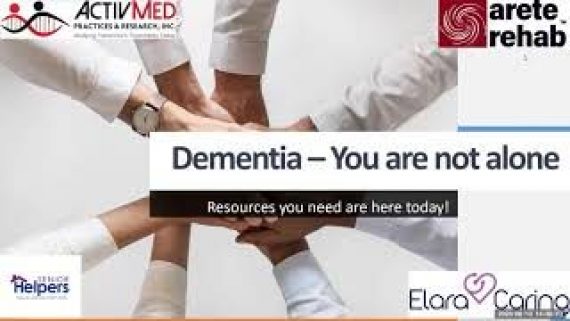Resources for Dementia- You are not alone
ActivMed and several community partners discuss no cost memory screenings, recent changes to Medicare benefits, physical therapy, and more.
Importance of Memory Screenings
Each year an annual check-up will review your blood glucose, blood pressure, and cholesterol levels, but why not memory?
A memory screening is a simple and safe evaluation with a trained professional to check memory and thinking skills.
A baseline memory screening will be able to provide your physician with information to help monitor changes in memory over time. Early detection can allow you to work with your doctor and make lifestyle changes or develop treatment plans.
Not all dementia is caused by Alzheimer’ disease. A memory screening may help to discover underlying medical conditions that could be contributing to memory decline.
ActivMed Practices & Research offers baseline memory screenings to the community at no cost. It is recommended that anyone over 55 get screened annually.
Learn more here, or call 978-655-7155.
Dementia Care Resources and Support in the Home
Accessing and Utilizing Medicare Part A Benefits- Jennifer with Elara Caring
There have been some recent changes in the Centers for Medicare & Medicaid Services due to COVID-19. Previously “homebound” statuses were strict. Due to COVID-19, they have been changed, increasing access to more home health benefits. Telehealth visits are also approved as an option.
Elara Caring has been working on assessing the needs of patients. Creating best practices for the dementia patients is also a goal. One important initiative is assessing the safety needs of patient. Keeping patients out of the hospital in the COVID-19 environment as much as possible is important.
Falling is a common safety risk for seniors.
- 1 in 4 adults over 65 fall each year
- 1 in 3 who fall, suffer an injury
- Of those who fall, 1 in 4 die as a result of their fall injury
- 1 in 2 seniors who fall, will fall again
Families and senior care facilities should have conversations on the types of care needed and advance care planning. There should also be plans in place for Hospice and palliative care. Elara has Dementia Certified Staff who can help with these uncomfortable conversations. These staff are able to help determine when a patient becomes eligible for the hospice medicare benefit.
Dementia: How Therapy Can Help- Nancy VanBenschoten, Arete Rehab
Therapy can provide treatment interventions throughout the stages of dementia to help individuals maximize their qualify of life and lower risk of falls. Various types of therapies can also help those with dementia maintain independence.
Providing education and support for the family, care providers, clients, and promoting the person’s strengths will ensure that those with dementia and their caregivers have the support needed to live life to the fullest.
Nancy VanBenschoten
Regular exercise and physical therapy can help reduce risk of falls, by helping with balance and gait.
Occupational therapy helps promote wellness and health. While these physical therapies may not reduce cognitive decline, they may help patients to be able to maintain independence. By maintaining strength and range of motion, patients can continue with their daily habits.
Speech therapy can also assist those with dementia and caregivers alike. By providing tools and strategies, therapy can help improve communication.
“Therapy is available through VNA services as well as Medicare Part B providers. “We always recommend if they can get a Part A provider, that gives them a longer time with therapy, and then upon discharge, a person can take on a Medicare Part B provider.” says Nancy. It gives caregivers other options for care that are covered by their health insurance.
In the current environment of COVID-19, all home health service providers and patients should be following all safety guidelines.
The Senior Gems® Program- Stages of Dementia
Senior Helpers uses a unique approach to caring for those with dementia. The Senior Gems approach was designed by Teepa Snow, an occupational therapist and partner of Senior Helpers. The program is a method for identifying characteristics of normal aging through late stage dementia.
Based on the Allen Cognitive Disability Theory, the gems are used to focus on what people can do, not their limitations. The six levels, or gems, range from Level 6- Sapphire- not having dementia, but experiencing memory loss, to Level 1- Pearl, which is the end-of-life phase.
By using the gems to categorize a person’s abilities and stage, Senior Helpers are able to provide the best care possible.
You can learn more about the stages of the Senior Gems program here.
Thank you to all the speakers for sharing their time and knowledge.
Check out the entire presentation and the Q&A session at the end.

